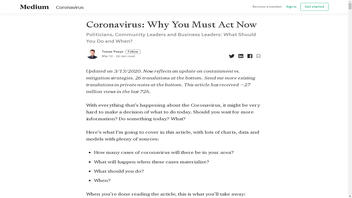
Did a story about the grave threat posed by the new coronavirus overstate the threat? No, it didn't. It may sound grim, but it's backed by science, according to medical experts.
The story, which has gone viral on social media, appeared in an article published by Tomas Pueyo on Medium on March 10, 2020, titled "Coronavirus: Act Today or People Will Die" (archived here), which opened with the subtitle 'Politicians, Community Leaders and Business Leaders: What Should You Do and When?' The top of the story read:
With everything that's happening about the Coronavirus, it might be very hard to make a decision of what to do today. Should you wait for more information? Do something today? What?
Here's what I'm going to cover in this article, with lots of charts, data and models with plenty of sources:
· How many cases of coronavirus will there be in your area?
· What will happen when these cases materialize?
· What should you do?
· When?
When you're done reading the article, this is what you'll take away:
The coronavirus is coming to you.
It's coming at an exponential speed: gradually, and then suddenly.
It's a matter of days. Maybe a week or two.
When it does, your healthcare system will be overwhelmed.
Your fellow citizens will be treated in the hallways.
Exhausted healthcare workers will break down. Some will die.
They will have to decide which patient gets the oxygen and which one dies.
The only way to prevent this is social distancing today. Not tomorrow. Today.
That means keeping as many people home as possible, starting now.As a politician, community leader or business leader, you have the power and the responsibility to prevent this.
You might have fears today: What if I overreact? Will people laugh at me? Will they be angry at me? Will I look stupid? Won't it be better to wait for others to take steps first? Will I hurt the economy too much?
But in 2-4 weeks, when the entire world is in lockdown, when the few precious days of social distancing you will have enabled will have saved lives, people won't criticize you anymore: They will thank you for making the right decision.
Ok, let's do this.
Users on social media only saw this:
Coronavirus: Act Today or People Will Die
Politicians and Business Leaders: What Should You Do and When?
Here's a welcome example of a well-crafted piece - essentially a modeling exercise that forecasts the possible rate of new infections - that earned approval from several public health experts for its accuracy.
"It is in the mainstream of epidemiologic analysis and modeling, and quite clearly written," said Richard Hopkins, a retired epidemiologist living in Vermont, in an email. "Knowledgeable people might argue with some of the details, but this strikes me as an honest document, and does not have any evident agenda other than improving the public's health."
Hopkins, who worked for 35 years in state health departments, added, "I do wish that people who write in this domain would mention that the original problem in Washington State, and perhaps parts of California, was a failure to identify imported cases and their contacts (back in January), isolate those who had symptoms, and quarantine the contacts.
"Had they been recognized," he continued, "they would have been tested -- they would have met even the narrow CDC [the Centers of Disease Control and Prevention] criteria for people who should be tested early on. I don't know why that early recognition and response did not happen: poor interviews or contact tracing? Asymptomatic travelers who became symptomatic later and did not follow instructions to report to public health? Giving a free pass to people traveling from Iran because Iran wasn't known to have a coronavirus problem? Asymptomatic people who infected others without ever getting symptoms? Etc."
Hopkins said he hoped that public health officials - either from Washington State's Department of Health or the CDC - figure out why the assessment of arrivals from countries with many cases of COVID-19 turned out to be ineffective. "It might help make the current approach to assessing Americans returning from Europe more effective," he said.
"The story is a bit dark and dire but for the most part the statements are valid," said Richard J. Kuhn, editor in chief of the journal Virology and a professor of science at Purdue University, in an email.
"It's a warning to take all of the closures and social distancing as serious," he added. "We can mitigate (not control) this outbreak, but most of us ordinary citizens must play our own role," as suggested by the CDC and by Dr. Anthony Fauci of the National Institute of Allergy and Infectious Diseases.
The author, Tomas Pueyo, is a vice president of growth at Course Hero, an online learning platform, and earned his MBA at Stanford University, according to his LinkedIn account.
He did not immediately respond to a request for comment.
Here are our most recent articles about coronavirus misinformation:
- Fact Check: Soldiers Are NOT On Streets Of Philly, NOT Hauling Off COVID-19 Patients To FEMA Camps
- Fact Check: Coronavirus Has NOT Been Found In Crab Legs
- Fact Check: New York City Is NOT Set To Undergo Citywide Quarantine
- Fact Check: Man NOT Infected With Coronavirus Who Claimed To Have Spread It At A Walmart In Louisiana
- Fact Check: Supermarkets Are NOT Recalling Coronavirus-Infected Toilet Paper
- Fact Check: The Coronavirus Scare Did NOT Start Immediately After Impeachment















